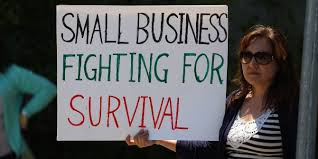HMRC umbrella company ‘checking tool’ looms for workers
Umbrella company consultation response and guidance due from HMRC, as more details come out on Tax Administration and...
READ MORE
After the shocks of Covid, Brexit and now the war in Ukraine, can the UK economy get through a period of high inflation? Kevin Reed gathers advisers’ views on the future.

The number of businesses entering insolvency tends to rise after a tough economic period, but what does it mean when that happens as UK stares a recession in the face?
The April 2022 insolvency statistics from the Office of National Statistics showed that the number of registered company insolvencies was 1,991; more than double the number in April 2021 and 39% higher than the pre-pandemic April 2019.
While the numbers are slightly down on the previous month, a “significant upward trend remains”, said Azets restructuring and insolvency director Simon Monks.
The figures in context of the removal of government financial support and its subsequent impact is understandable, but Monks points to the leap compared to pre-pandemic times as a major concern.
“This suggests a realignment of economic resource and a clearing out of entities that are no longer economically viable, that might have been able to survive the pandemic due to support schemes,” said Monks.
“The notable increase in creditors' voluntary liquidation (CVLs) demonstrates that directors and other stakeholders are beginning to act to address corporate financial woes.”
And Monk expects this trend to continue, as funding requires repayment. “Our expectation is that these will increase as government and other creditor stakeholders assess support lines and look to recover where this makes financial and economic sense.”
However, the UK faces a cost-of-living crisis. The current rate of inflation is 9% and businesses are struggling to balance their own cost increases with maintaining sales of their goods and services.
“We're seeing an increasing number of companies facing impacted turnover, unable to compete, reducing personnel, scaling back on investment plans and exiting markets,” said Ed Rimmer, CEO of Bath-based SME finance provider Time Finance.
Wildcat Law barrister and co-founder Tahina Akther said current conditions were a “perfect storm” of rising costs and constrained spending.
“The cost of providing services is going up but that is not being matched by the willingness, or even the ability, of customers to pay for the rising costs,” said Akther. “Many established businesses are telling us that they are rapidly running out of money and liquidity is fast drying up as the banks tighten their lending criteria.”
Azets’ Simon Monks said the current conditions were not all doom and gloom, particularly with the availability of capital – and the current conditions were still part of a realignment of underperforming businesses finally pulling the plug.
“We would expect the upward trend in corporate insolvencies to continue as the economy gradually returns to a business-as-usual state. But this should not necessarily be looked upon as a bad thing given the continued availability of capital, which can be utilised to put such resource to better use,” Monks explained.
Vibrant Accountancy’s Beverley Wakefield is also urging businesses to stay positive. “Yes, there are countless businesses struggling, but there are also many businesses that are thriving,” said Wakefield.
“With all the doom and gloom dominating the headlines about looming recessions, soaring inflation and rising interest rates, it's important business owners reflect a minute and pat themselves on the back.
“If they can succeed and stay afloat in trading conditions like this, just think about how they'll perform when the economy settles down."
But continuing to trade will rely on customers spending. Azets partner Louise Brittain noted that the number of people entering individual voluntary arrangements (IVAs) was still markedly higher than pre-pandemic.
“With the massive increase in the cost of living being felt this month, it will be interesting to see how individuals spending behaviours change and whether those additional spending items like holidays, new cars and the more luxury items are impacted,” Brittain said.